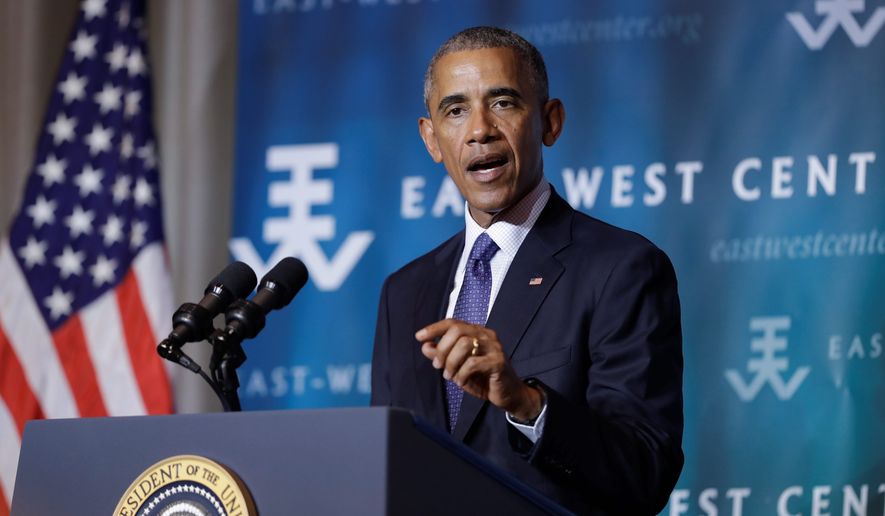The Obama administration and its allies cut a “secret” agreement allowing Iran to evade key restrictions under last year’s nuclear deal so Tehran would be able to receive major sanctions relief by the deal’s deadline, according to a report Thursday that put the White House on the defensive again about the controversial deal.
The report from the Institute for Science and International Security — a think tank run by a prominent former U.N. weapons inspector — said loopholes have been created to allow Iran to exceed limits set by the actual deal on the amount of uranium it can keep on hand in its various nuclear facilities.
Republicans were quick to jump on the report from the respected think tank, which comes as Iran’s military has staged a series of aggressive challenges to the U.S. Navy in the Persian Gulf and Mr. Obama was already under fire for his handling of a prisoner swap with Tehran in January that coincided with the payment of a major settlement to Iran.
“The exemptions or loopholes are happening in secret, and it appears that they favor Iran,” David Albright, the former inspector, told Reuters, which first reported on Thursday’s report, the claims of which have not been officially verified.
Clearly stung, administration officials pushed back hard Thursday, claiming the assertions were baseless and that lawmakers on Capitol Hill were briefed on both the public and classified parts of the deal.
The notion that some sort of secret deal undercut the nuclear agreement is simply “not founded,” said State Department spokesman John Kirby, who said a team now overseeing the accord’s implementation “has not and will not loosen any of the commitments, and has not provided any exceptions that would allow Iran to retain or process material in excess of its [the agreement’s] limits.”
“There’s been no moving of the goalposts,” Mr. Kirby said. “Any suggestion to the contrary is just false.”
But critics were already pouncing. The report “will deepen concerns the administration is hiding damaging information about concessions it’s made to Iran,” said Omri Ceren, a managing director at the Washington-based Israel Project.
“ISIS confirmed the U.S. and its partners gave Iran exemptions,” Mr. Ceren wrote in an email blasted out to news organizations, using an acronym for the Islamic State. “As with past concessions, Congress was only briefed on the details ’in a confidential manner,’ and so the details were kept from the public.”
The report is likely to deepen frustration among Republicans, whose presidential nominee, Donald Trump, has vowed to overturn the deal if elected in November.
The agreement, signed by Iran with the U.S., Britain, France, Russia, China and Germany, eases a series of international economic sanctions on Tehran in exchange for curbs of up to 15 years on Iran’s suspect nuclear programs.
Several GOP lawmakers have accused Mr. Obama of intentionally keeping Congress in the dark on critical details of the deal reached last summer.
“This is yet another example of the administration’s false choice it presented to the American people in selling the flawed Iranian deal that provides the mullahs a patient pathway to the bomb,” Sen. Corey Gardner, Colorado Republican, said Thursday.
The administration was already under fire for a $400 million cash payment in January to Iran on the same day five Americans held prisoner by Iran were freed. The money was part of a settlement for a failed U.S. military sale to Iran dating back decades.
Mr. Obama had vigorously denied the payment was a kind of “ransom,” but the ransom payment’s timing was sensitive. It came just as the so-called “joint commission” of international officials assigned to oversee the implementation of the Iran nuclear deal were finalizing the accord’s final terms with Tehran. Mr. Kirby later acknowledged the payment was held up as “leverage” to make sure the American prisoners were allowed to leave Iran.
The two most striking exemptions, according to the Islamic State report, relate to Iran’s uranium stockpiles. The report said commission members secretly agreed to allow Iran to exceed the nuclear deal’s publicly stated limits on how much low-enriched uranium it can possess — material that, if purified into highly enriched uranium, could be used to develop a nuclear weapon.
It also cites a “knowledgeable” but unidentified senior official saying that some of Iran’s nuclear facilities would not have been in compliance with the deal by Jan. 16, the deadline for the beginning of sanctions relief, if the exemptions weren’t granted.
The Islamic State analysts say Obama administration officials actually informed Congress of the exemptions in a confidential report on that very day, the so-called “Implementation Day” of the nuclear accord. But Democratic Senator Robert Menendez, a leading critic of the Iran deal and a senior member of the Senate Committee on Foreign Relations, told Reuters that he “was not aware, nor did I receive any briefing [on the exemptions].”
Committee Chairman Bob Corker, Tennessee Republican, told wire services that the Obama administration was “willing to accommodate Iran at every turn to implement a flawed agreement that granted Tehran billions in sanctions relief and paved the way for the industrialization of its nuclear program.”
• Guy Taylor can be reached at gtaylor@washingtontimes.com.




Please read our comment policy before commenting.